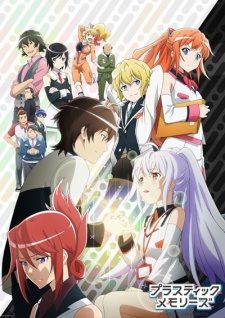
As soon as the words “Terminal Service” come across the screen, we all know what kind of show is in store with Plastic Memories. Walking among the humans of a near-future Japan are robots called Giftias, which function not as helpers or servants, but as family members and close friends, and sometimes even lovers. But all products have a lifespan, and the memories in a Giftia have a set expiration date of 81,920 hours, meaning that in a little less than 10 years of bonding it is time to send one of your dearest friends to the eternal abyss, to avoid the unfortunate consequence of the memories rapidly degenerating and the robot turning into a walking menace to society. And so we meet Tsukasa and Isla, a boy and a girl, a human and a Giftia, partners whose job is collecting the Giftias at their expiration date and ripping the bonds of friendship and love apart. Oh, what could possibly be in store for them?
Note that part about the degeneration: the obvious place where a show with splitting friendships goes is some sad sap running away with his robot, and simply ending up with a dead shell of a friend didn’t quite have the tension as turning them into roaming killing machines. One arc follows such a degeneration, including plots with black market Giftia recoveries and military brutality, but rather than qualify the world they seem to be shoehorned in to preserve the moral integrity of the characters, so rather than “withholding” the Giftia from recovery, it was “stolen” by circumstances out of their control. But thankfully, the power of emotion and love breaks through the technological process they have spent the whole show touting, which comes very much across as a contrivance. It pushes the simple idea of fate into something more technical and drastic than it has any need to be, and then subverts that for a good cry.
While I said we know what kind of show is in store from the first episode alone, that is more a reference to plot, as there is really no good judge of enduring quality from early snippets. The oddest choice Plastic Memories made is the blending—or rather dicing—of emotional and poignant scenes with slapstick humor, the knife that cuts right through the show’s message. Aside from the degenerating issue, most of the drama is well justified and kept within permissible boundaries of melodrama. Most notably, the last episode was as good as it possibly could have been, avoiding every instance of needless incongruous humor while still remaining light, and having incredibly realistic writing and drama that actually had me on the verge of tears, even though I had gone in knowing exactly how it would end. Why does the show insist on taking that formula and cutting into it with clumsy slice of life antics at every other turn? The color palate is light enough to justify not having repetitive drama, sure; no one needs thirteen episodes of ceaseless melodrama. But that comedy was the wrong choice, pure and simple.
And the characters are more modeled for the comedy than the robot collection job. The humans and Giftias pair up, allowing the Giftia member to sympathize and bring relaxation to their recovery target while the human member to get the necessary forms signed, oversee the process, etc. That makes a lot of sense as a work model, but it makes even more sense as a group of two-person boke-tsukkomi routines, and in the absence of seeing the side characters working in the field that’s all we really get. Their names are irrelevant: we have a tsundere human girl having her “true emotions” constantly exposed by her grade school male Giftia partner, an older human male who goes out and plays with women at the bar being scolded by his work-obsessed female Giftia partner, a soft-spoken but handsome Giftia male with glasses who has a partner we rarely ever see, and so on. And if we are being honest, even the central pair of Tsukasa and Isla is just the cookie-cutter nice guy rookie paired with the clumsy and bashful ditz; I don’t have a truly original thing to say about either.
But we are in luck; from the first episode, a nice introduction to the world and the coming sadness that never actually comes, everything about the trajectory of the plot can be deduced. There is nothing wrong with having a show this straightforward, but likewise there is no reason to actually sit through it given the poor quality of the show’s execution. So watch the first episode and skip right to the last one or two. As they open you’ll quickly fill in all the holes, and you’ll be just as attached to the characters, or even more so, than if you had spent the time to see them do nothing interesting in a spectacularly bad fashion. Fill in the holes, watch through to the last moments, maybe even have yourself a good cry, and walk away imagining all the wonderful places this interesting scenario may have gone. Ignorance is bliss sometimes.
PS: My Japanese friend wrote his own review for Plastic Memories at the end of mine while I was in the bathroom, which I've reproduced here in full. Note that he knows absolutely nothing about the show and didn't even read my piece, so he really just took a guess with this one:
"I really dislike this animation. This is weird and disgusting. I think most of the people hope from the bottom of their mind that this animation will be deleted. lol see you next generation. ( O m O 0 )"